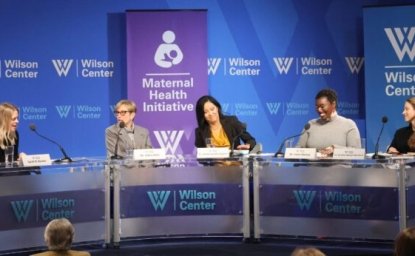The Maternal Health Initiative launches the CODE BLUE series on non-communicable diseases and maternal health

Each year, non-communicable diseases (NCDs) account for 2 in every 3 deaths among women globally. It is estimated that NCDs kill 35 million people each year, and women of reproductive age make up about half of these deaths. The compounding effects NCDs have on pregnancy complicate women’s experiences in many unseen ways. The rise and gravity of NCDs pose a growing and often overlooked challenge to maternal health worldwide.
In our new series, CODE BLUE, the Wilson Center and Emd Serono, a business of Merck, KGaA, Darmstadt, Germany, are partnering to bring to light and investigate what’s behind these alarming statistics and how NCDs directly (and indirectly) impact women’s lives, particularly during their reproductive years. The CODE BLUE fact sheet provides a snapshot of seven NCDs most threatening to maternal health both in the United States and around the world: cardiovascular disease; diabetes; hypertension; thyroid disease; cancer; multiple sclerosis; and mental health.
Every day, 830 women around the world die from pregnancy or childbirth-related complications, the vast majority of which are preventable. While direct causes of maternal death like hemorrhage and infection are still recognized as the leading causes of maternal mortality, we are seeing an obstetric transition globally that includes more indirect causes of maternal death, such as NCDs. The uptick of NCD prevalence around the world in young people due in part to changing lifestyles and socioeconomic factors will only increase women’s risk of experiencing NCDs during pregnancy. In many countries, including the United States, racial bias present in the healthcare system also fuels the high rates of maternal morbidity and death.
Several key NCDs detailed in the CODE BLUE fact sheet share similar risk factors, symptoms, and consequences. For example, obesity, affects up to 30 percent of pregnant women, and increases a woman’s risk of several NCDs (cardiovascular disease, hypertensive disorders, and diabetes, for example), as well as the risk of premature labor and infant death. Hypertensive disorders result in approximately 76,000 global maternal deaths each year and are a compounding effect of several other NCDs. Mood or anxiety disorders affect around 10 percent of all pregnant women around the world and roughly 13 percent of women post-partum. Discontinuation of medications for mental illness and for other NCDs like multiple sclerosis can lead to an increase in relapse of these chronic conditions. Given the intersections present in NCDs and maternal health, it is crucial to examine these relationships to improve maternal health outcomes.
The seriousness of NCDs and their direct and indirect effects on women of reproductive age are coming to the forefront of discussions in a multitude of disciplines. The CODE BLUE series will take a multidisciplinary approach to looking at the current status of NCDs across the globe and what is currently being done to increase and improve education, diagnoses, and treatment of NCDs. The series will also explore research and policy gaps, as well as the steps needed to improve progress towards the 2030 Sustainable Development Goals of reducing the global maternal mortality ratio to fewer than 70 maternal deaths per 100,000 live births and decreasing NCD-related deaths by one-third.
To learn more:
- New Report: Six Steps Towards Ending Preventable Maternal Mortality
- Non-communicable diseases and maternal health
- Race, Bias, and Equity in Prenatal Care: No Pregnant Woman is the Same
- How Are We Failing American Women? Alarming Trends of U.S. Maternal Mortality
Code Blue: The growing thre... by The Wilson Center on Scribd

Maternal Health Initiative
Housed within the Wilson Center's Environmental Change and Security Program, the Maternal Health Initiative (MHI) leads the Wilson Center’s work on maternal health, global health equity, and gender equality. Read more

Explore More
Browse Insights & Analysis
Closing the Women’s Health Gap: Research, Investment, and Eliminating Inequities

2024 Dot-Mom Guest Contributor Highlights

